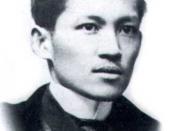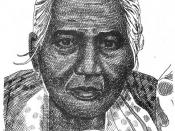A relevant question to ask before watching the film is "are you a Filipino?" Giggle, smile, sympathize, and maybe relate to the characters of this film if you are. Otherwise, prepare to see a glimpse of only some of the many wonderful cultures of the traditional Filipinos.
Gene Cajayon's "The Debut" revolves the relationship between Ben Mercado (Dante Basco), an Americanized Filipino, and his Filipino family. Tomorrow is the big day as the family of Ben gets busy in preparing their performances for his sister Rose's (Bernadette Balagtas) debut; well, not in the case of Ben. This film starts with excellent drawings of caricatures of all sorts of people flashing across the scene. (Later it was understood that these were Ben's masterpieces.) Ben stays in his room upstairs drawing while the rest of his family prepare for the big day. Clearly, Ben is not interested in his sister's debut, and so is seeing his fellow Filipino friends attending the debut.
Otherwise, he is chooses to hang out with his white friends during his sister's debut celebration.
Tension arises as Ben's character unfolds. Ben loves drawing, and his passion in the field of art contradicts what his father, Roland (Tirso Cruz III), wants him to become. Roland even considered Ben's passion as just a "silly hobby", and he is not willing to waste his money in enrolling Ben in an art school which, according to him, does not assure his son a good future. "Stop it with those silly pictures of yours!" asserts Roland.
The tension between Ben and his Filipino family is further magnified during the debut itself. He seems so foreign to his fellow Filipino community. He doesn't even know what to do with his grandfather's hand during the start of the debut, symbolizing that he lost his Filipino identity. Ben's character is transformed towards the middle of the film when his sister reminds him that he is "just as brown as the rest of us [Filipinos]." From then on, different things unfold as Ben eventually realizes the pride of being a Filipino.
Being the first Filipino-American film, the film tries to achieve two things: first, to present the lifestyle of Filipino-Americans and the typical problems Filipino-American families face (such as cultural identity problems), and second, to bring the viewers the cultures and traditions of the Philippines, as well as some of Filipino traits and characteristics.
The plot of the film helps achieve the film's first objective. Though it was rather a simple and predictable plot, the typical life of Filipinos living in America is very well presented in this film, through the life of Ben and his family. This film touches on different issues such as rebellion, family ties, and cultural identity which all Filipinos can relate to. Rebellion is excellently represented in this film; since there is oppression (Roland kept insisting that cartoons won't lead Ben to anywhere), there is rebellion (Ben secretly sells all his comic book collections just to pay his tuition fee and get enrolled in the art school). Along with this concern comes the issue on family ties, the father-son relationship between Ben and Roland, and is further magnified with the entrance of Ben's grandfather. Lastly, the issue on cultural identity is stressed during the debut of Rose, where Ben is forced to choose between his sister's debut celebration (Filipino identity) and his friends' party (American identity).
However, the limit of the film is clearly the range of audience. The mix of drama and comedy only works for the Filipino audience. If we look at the plot carefully, it resembles a typical storyline - the main character does not understand the "world" but soon realizes the world's beauty. But as a Filipino, I am greatly affected in this film since I fully understand the context and the situation of the film. Most Filipinos are ashamed of their nationality and therefore deny that they are true Filipinos. But this film makes the Filipinos think again and realize that their country is really full of riches, and this is something to be proud of. Also, the comedy of the film is rooted from Filipino cultures. Remember the scenes where Ben shakes his grandfather's hand and when a guy pees on the wall. Filipinos subconsciously think that "hey, that's wrong!" and "hey, I usually see that guy along the streets of Metro Manila". These scenes are able to make the Filipinos look back and recall some scenes that happened in their everyday life here in the Philippines, and acknowledge that those parts of the film are humorous. But what if the audiences are not Filipinos? Can they appreciate the essence of this film? Well, maybe yes, but not as much as a Filipino viewer.
The film is able to achieve its second objective through its excellent production design and sound. This was evident throughout Rose's debut celebration, especially during the dance number of Rose and her friends. I can say that the Filipino traditional dances were well-researched and well-prepared since the dance numbers are able to capture the real image and soul of the Philippine folk dance. As Rose enters the stage, the colorful and sophisticated costumes already show the pride of Filipinos in their art and culture. Accompanied by it is a wonderful ethnic dance called "tinikling". Behind the dance floor is a line of men wearing "barong tagalog", playing a traditional guitar which created a solemn atmosphere around the hall. This performance attempts to create a wonderful image of the Filipinos culture; and for me, it was a success. These two elements mentioned above (production design and sound) are the major players in this film. Through these elements, it is able to open the world of Filipino cultures to the foreign viewers of this film.
The film is also able to showcase some of the Filipino attitudes and traits. In terms of the physical aspect, Annabelle (Joy Bisco) in the latter part of the film told Ben that his "nose was nice", which is a characteristic of most Filipinos. Filipinos' hospitality is also shown through the scenes where Ben's mother invites Doug and Rick to eat in their house (the first scene), and to join in the celebration of Rose's debut (the other scene). In addition, the film is able to bring out the romantic side of the Filipino through Roland's singing to his wife (what we call "harana").
The success of the movie may be attributed to the director's excellent choice of Filipino characters, which created a heart in the film and made this film even more realistic. We can contrast this to the "Mano Po" series which, for me, failed to carry the spirit of the Filipino-Chinese way of life. In the film "Mano Po", the director used Filipino actors/actresses to portray Filipino-Chinese characters. Though the actors/actresses are very talented (like Eddie Garcia and Kris Aquino), the film was not realistic in the sense that Filipino-Chinese identity is not seen through these actors - physical attributes of Filipino-Chinese absent, words not pronounced well, and no fluency in speech just to name a few. I might be skeptical with this aspect of the film because I myself am a Filipino-Chinese; but considering the fact that the film is played in the Philippines and a large fraction of the Filipinos are partly Chinese too, they should have chosen Filipino-Chinese actors/actresses play the leading roles.
On the other hand, the director of "The Debut" is excellent in getting Filipino actors to play the roles of Filipino-American characters. It adds to the genuineness of the film which, I felt, is an important "x-factor" in this film. Through the family's all-Filipino casts (Eddie Garcia, Tirso Cruz III and Gina Alajar), the film is able to attack the hearts of the Filipinos and make them feel that they are also part of the film. Eddie Garcia and Tirso Cruz III were remarkable in representing the father figures in a typical Filipino family. They definitely didn't disappoint the Filipino viewers in this film.
If the audiences were Filipinos, the movie may be seen as a success. It is able to generate drama and comedy at the same time, and remind the viewers how beautiful the Filipino cultures are. But if it was a foreigner watching the film, he/she may feel short on the traditional dances and songs presented in the film, and miss the impact the movie seek to generate in himself/herself.
Greatly recommend this film to Filipinos, as well as Filipino-Americans.


